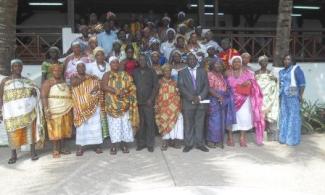
The traditional leaders, representing all the 45 traditional sub divisions in the region, threatened to embark on series of demonstrations if their call is ignored. They say the introduction of the bill in its current form will pose a threat to public health, food security and the independence of small farmers.
Queen mothers in the Brong-Ahafo region of Ghana have unanimously called on the country's parliament not to pass the Plant Bleeders Bill.
The traditional leaders, representing all the 45 traditional sub divisions in the region, threatened to embark on series of demonstrations if their call is ignored. They say the introduction of the bill in its current form will pose a threat to public health, food security and the independence of small farmers.

The Plant Breeders Bill will permit the introduction of genetically modified organisms (GMO) into the country, and is currently before the House, believed to be at the consideration stage.
Speaking at a two-day workshop for Traditional Women Leaders in Environmental Management through Improved Hygiene and Ecological Sanitation organised by the Centre for Indigenous Knowledge and Organisational Development (CIKOD) in collaboration with Konrad Adenauer Stiftung, President of the Queen mothers Association of Brong-Ahafo Region, Nana Abena Boatemaa I, said the association supports the position of the Regional House of Chiefs, which issued a communiqué on July 9, 2014 advising Parliament to reject the bill.
Nana Abena Boatemaa, who is also the queen mother of Odomase #1 and National President of the Association of Women Traditional Leaders, indicated that they would do everything possible to resist the passage of the bill as they are prepared to move to Parliament to engage the MPs to withdraw the bill.
Several other groups have opposed the introduction of the Plant Breeders Bill on similar grounds. The Convention People’s Party (CPP), Food Sovereignty Ghana, The Coalition of Ghana Farmers Association, Movement for Farmers Right Against GMO Ghana, National House of Chiefs, Brong Ahafo Traditional Chiefs and many other civil societies in the country are among the many identifiable groups that have opposed the bill's introduction.
Experts say over 166 countries, including Ghana’s leading trading partner, the European Union (EU), have officially banned genetically modified foods, making it even more disadvantageous for Ghana to embrace the the technology.